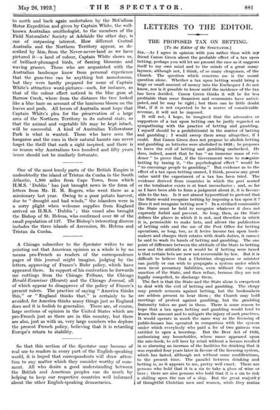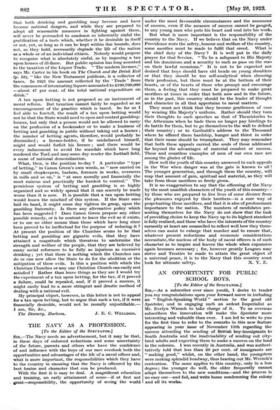LETTERS TO THE EDITOR.
THE PROPOSED TAX ON BETTING.
[To the Editor of the SPECTATOR.] Sne,—As I agree in opinion with you rather than with my friend Canon Green about the probable effect of a tax upon betting, perhaps you will let me present the case as it suggests itself to my own mind and to the minds of a great many laymen, although not, I think, of so many clergymen, of the Church. The question which concerns me is the moral question alone. Whether a tax upon betting would bring a large or small amount of money into the Exchequer I do not know, nor is it possible to know until the incidence of the tax has been decided. Canon Green thinks it will be far less profitable than some financiers and economists have antici- pated, and he may be right ; but there can be little doubt that, if it is not expected to be a source of considerable revenue, it will not be imposed.
It will not, I hope, be imagined that the advocates or supporters of a tax upon betting can be justly regarded as sympathizing with the practice of betting and gambling. I myself should be a prohibitionist in the matter of betting and gambling ; I would sweep them away altogether, if I could. But Canon Green does not propose to abolish betting and gambling as lotteries were abolished in 1826 ; he proposes to leave the evil of betting and gambling unchecked. He does, indeed, assert that he has " an immense mass of evi- dence " to prove that, if the Government were to realvnize betting by taxing it, " the psychological effect " would be " to encourage people to gambling." But evidence as to the effect of a tax upon betting cannot, I think, possess any great value until the experiment of a tax has been tried. The evidence derived from countries in which the pari mutuel or the totalisator exists is at least inconclusive ; and, so far as I have been able to form a judgment about it, it is favour- able to the tax. Is it not almost hypocritical to pretend that the State would recognize betting by imposing a tax upon it ? Does it not recognize betting now ? In a civilized community the State must be held to recognize whatever it does not expressly forbid and prevent. So long, then, as the State defines the places in which it is not, and therefore in which it is, permissible to make bets, and allows the publication of betting odds and the use of the Post Office for betting operations, so long, too, as it levies income tax upon book- makers and charges their estates with death duties, it cannot be said to wash its hands of betting and gambling. The one point of difference between the attitude of the State to betting now and the attitude as it would be if betting were taxed is that certain bets are now not recoverable by law. But it is difficult to believe that a Christian clergyman or minister can justify or can wish to propagate a system under which men incur pecuniary liabilities, even without the express sanction of the State, and then refuse, because they are not legally compelled, to discharge them.
The fact is that the State and the State alone is competent to deal with the evil of betting and gambling. The clergy may preach sermons against betting, but the bookmakers are seldom present to hear them ; the Church may hold meetings of protest against gambling, but the gambling fraternity takes no part in them. There is some reason to hope that a tax upon betting and gambling would tend to lessen the amount and to mitigate the injury of such practices. It would operate in much the same way as the licensing of public-houses has operated in comparison with the system under which everybody who paid a fee of two guineas was entitled to open a beershop. But the Beer Act of 1830, authorizing any householder, whose name appeared upon the rate-book, to sell beer by retail without a licence resulted in so alarming an increase of the facilities for drinking that it was repealed four years later in favour of the licensing system, which has lasted, although not without some modifications, to the present time. The parallel between drinking and betting is, as it appears to me, pretty well exact. There are persons who hold that it is a sin to take a glass of wine or beer ; there are also persons who hold that it is a sin to risk a shilling upon the run of a ship. But the great majority of thoughtful Christian men and women, while they realize
that both drinking and gambling may become and have become national dangers, and while they are prepared to adopt all reasonable measures in fighting against them, will never be persuaded to condemn as inherently sinful the gratification of a taste which, whether it be desirable in itself or not, yet, so long as it can be kept within due bounds, does not, as they hold, necessarily degrade the life of the nation as a whole or of an individual citizen. Nobody would propose to recognize what is absolutely sinful, as by imposing a tax upon houses of ill-fame. But public opinion has long assented to the taxation of the Liquor Trade. " The modern licensee," says Mr. Carter in his book on The Church and the Drink Evil (p. 58), " like the New Testament publican, is a collector of taxes. In 1921 the amount collected by the Trade ' from the consumers of intoxicating liquors amounted to £190,700,000 —about 47 per cent. of the total national expenditure on drink."
A tax upon betting is not proposed as an instrument of moral reform. But taxation cannot fairly be regarded as an encouragement of the practice which is taxed. So far as I feel able to foretell, the result of a tax upon betting would not be that the State would need to open and control gambling- houses, but only that a person would not be allowed to carry on the profession of a bookmaker or to make a business of betting and gambling in public without taking out a licence ; the number of betting agents, therefore, would probably be diminished ; a licence-holder, if he misbehaved himself, might and would forfeit his licence ; and there would be every inducement to avoid the scandals which have long rendered the Turf, and may some day render the football field, a scene of national demoralization.
What, then, is the position to-day ? A particular " type of betting," in Canon Green's own words, as " now carried on by small shopkeepers, barbers, foremen in works, overseers in mills and so on," is " at once morally and financially the most ruinous and practically the hardest to control." The pernicious system of betting and gambling is so highly organized and so widely spread that it can scarcely be made worse than it is now. It is possible that .a tax upon betting would lessen the mischief of this system. If the State once laid its hand, it might some day tighten its grasp, upon the gambling fraternity. Is there any alternative policy which has been suggested ? Does Canon Green propose any other possible remedy, or is he content to leave the evil as it exists, or to use no other means than those which have long since been proved to be ineffectual for the purpose of reducing it ? At present the position of the Churches seems to be that betting and gambling are gigantic evils, that they have attained a magnitude which threatens to undermine the strength and welfare of the people, that they are believed by many social reformers to be fully as injurious as excessive drinking ; yet that there is nothing which the Churches can do or can now allow the State to do for the abolition or the mitigation of these evils. Is this a position with which the Christian Churches or any one Christian Church can easily rest satisfied ? Rather than leave things as they are I would try the experiment of a tax upon betting, for the tax, if it proved a failure, could be repealed, and, if it proved a success, it might easily lead to a more stringent and drastic method of dealing with a national evil.
My principal object, however, in this letter is not to appeal for a tax upon betting, but to argue that such a tax, if it were financially desirable, would not be morally unjustifiable.— I am, Sir, &c.,











































 Previous page
Previous page